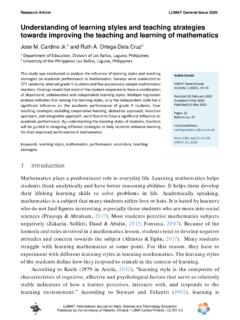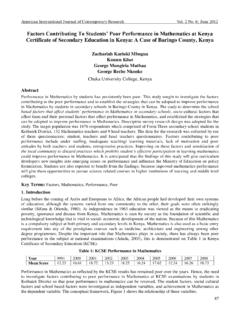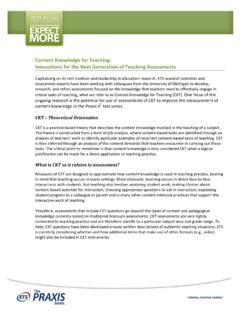Transcription of Teaching, leadership and governance in Further Education
1 teaching , leadership and governance in Further Education Research report February 2018 Prof David Greatbatch and Sue Tate 2 Contents A note on terminology 6 Glossary of acronyms 7 Executive summary 11 Introduction 11 Research objectives 11 Methodology 11 Key findings 12 teaching quality 12 Continuing professional development 13 leadership 13 governance 14 Supply issues 15 Chapter 1 Introduction 16 Background 16 Research objectives 17 Scope of the review 17 Chapter 2 Methodology 18 Literature review 18 Search protocol 18 Study
2 Selection 19 Synthesis and analysis 19 Interviews 20 Chapter 3 The quality of teaching 21 Summary 21 teaching qualifications 22 Dual professionalism 26 Subject specialisms and mentoring 27 Monitoring teacher quality 29 Vocational Pedagogy 31 3 English and maths 36 Chapter 4 Continuing Professional Development 41 Summary 41 Background 41 Effective Continuing Professional Development 42 Chapter 5 leadership 49 Summary 49 leadership in the FE sector 50 Individual and collective models of leadership 52 The importance of context to leadership 56 Diversity and leadership 58 Leader behaviours required in the FE sector 59 Insights from beyond the sector 61 Chapter 6 governance 63 Summary 63 The governing bodies of FE colleges 64 Composition of governing boards 65 The role of chairs of governors 66 Role and responsibilities of clerks 68 The role of senior managers 70 Self-assessment of performance 70 Chapter 7 Supply issues 72 Summary 72 teaching staff 72 Leaders 73 teaching staff 74 Strategic challenges 74 Initiatives to support the recruitment and
3 Development of teachers 76 Leaders 77 Chapter 8 Interviews 83 Summary of the views expressed by the interviewees 83 4 Introduction 84 quality of teaching 85 Sector stakeholders 85 Academics 86 Continuing Professional Development 86 Sector stakeholders 86 Academics 88 leadership 88 Sector stakeholders 88 Academics 89 Governors 90 Sector stakeholders 90 Academics 90 Supply/recruitment 91 Sector stakeholders 91 Academics 92 Future challenges 92 Chapter 9 Conclusions and evidence gaps 94 Conclusions 94 The quality of teaching 94 Continuing professional development 94 leadership 95 governance 95 Supply issues 96 Evidence gaps 97 The quality of teaching 97 Continuing Professional Development 97 leadership 98 governance 99 Supply Issues99 Bibliography 100 5 The quality of teaching 100 Continuing Professional Development 102 leadership 103 governance 110 Supply issues 112 6 A note on terminology Throughout this report, the terms lecturer and teacher are used interchangeably depending on which term is used in the primary literature.
4 7 Glossary of acronyms A AAETO Association of Adult Education and Training Organisations AET The Award in Education and Training ACL Adult Community Learning AoC Association of Colleges AELP Association of Employment and Learning Providers ATLS Associate Teacher Learning and Skills B BAME Black, Asian, and minority ethnic BIS Department for Business, Innovation and Skills C CAVTL The Commission on Adult Vocational teaching and Learning Cert Ed Certificate in Education CET The Certificate in Education and Training CETTs Centres for Excellence in Teacher Training CPD Continuing Professional Development CTLLS Certificate in teaching in the Lifelong Learning Sector D DET The Diploma in Education and Training DfE Department for Education 8 DfES Department for Education and Skills DTLLS Diploma in teaching in the Lifelong Learning Sector E EEF Education
5 Endowment Foundation ESOL English for Speakers of Other Languages ETF The Education and Training Foundation F FE Further Education FENTO Further Education National Training Organisation G GCSE General Certificate of Secondary Education H HE Higher Education HEI Higher Education Institutions HoD Head of Department HOLEX Heads of Local and External Institutions I ICT Information and Communication technology IfL The Institute for Learning 9 INSET IN-SErvice Training day ITT Ini tial Teacher Training L LLUK Lifelong Learning UK LSC Learning and Skills Council LSDA Learning and Skills Development Agency LSIS Learning and Skills Improvement Service O OECD Organisation for Economic Co-operation and Development Ofsted Office for Standards in Education OTL Observation of teaching and learning P PGCE Post Graduate Certificate in Education ProfGCE Professional Graduate Certificate in Education PTLLS Preparing to Teach in the Lifelong Learning Sector Q QTLS Qualified Teacher Learning and Skills status QTS Qualified
6 Teacher Status 10 R RAMR Reality, Abstraction, mathematics and Reflection RME Realistic Maths Education S SMT Senior Management Team STEM Science, technology, engineering and mathematics SVUK Standards Verification UK T T-levels Technical qualifications to be phased in between 2018 and 2022 V VET. Vocational Education and Training 11 Executive summary Introduction The Further Education (FE) Sector is now undergoing significant reforms. Apprenticeships 2020,1 the Report of the Independent Panel on Technical Education (usually referred to as the Sainsbury Review2) and the subsequent Post-16 Skills Plan3 provide a framework under which the Department for Education (DfE) will reform the skills landscape.
7 The specific immediate challenges to which teachers and leaders in the sector must rise are those relating to the new technical Education routes, the delivery of high quality apprenticeships and raising standards in English and mathematics . For the Department s reform programme to be successful there is a need to ensure that FE teachers, leaders and governors are of high quality and are high performing. Research objectives In April 2017 Professor David Greatbatch (working with Sue Tate) was appointed to conduct a rapid evidence review in order to synthesise the available evidence on teaching , leadership and governance in the FE sector.
8 The evidence reviewed covered the whole FE sector but with a specific focus on FE colleges. Methodology Key publications and statistical data were gathered through online searches of national and international online bibliographic and information databases. The findings from the individual studies were summarised, synthesized and critically assessed under key headings and research questions agreed with DfE. The evidence review was supplemented by semi-structured telephone interviews with 14 sector stakeholders and academics. 1 -england-vision-for-2020 2 3 12 Key findings teaching quality Findings from the literature review The tensions between lecturers4 in FE being both occupational professionals passing on their expertise and teachers with access to pedagogical theories and techniques (dual professionalism) is identified as a challenge in the literature.
9 Most FE teachers teach in the sector for a year or more before beginning initial teacher training. Initial teacher training (ITT) courses are largely generic in nature and rely on trainees ability to contextualise their learning for their own specialism with the support of subject mentors. The quality of subject mentoring available in colleges remains variable. There is a consensus in the literature that high quality vocational Education always involves a blend of methods, is often experiential in nature, and involves feedback, questioning, application and appropriate theoretical models and explanations.
10 However, evidence of the impact of different pedagogical approaches on learners is weak. Recent attempts to define vocational pedagogy have been hampered by the huge diversity of the sector. teaching quality has largely been monitored through lesson observations modelled on Ofsted (Office for Standards in Education ) practices but there is a lack of evidence on how current practices operate to improve quality and improve learners outcomes. There is evidence that English and maths pro
















